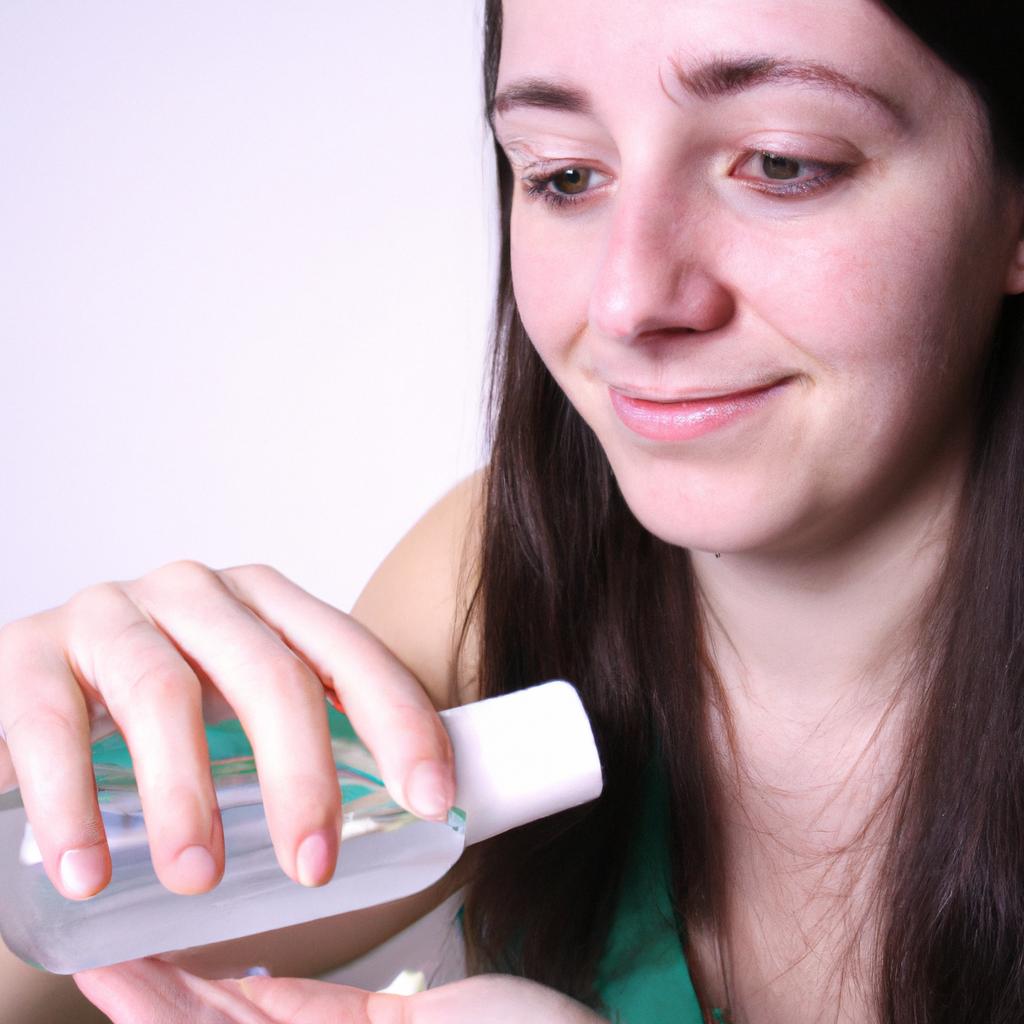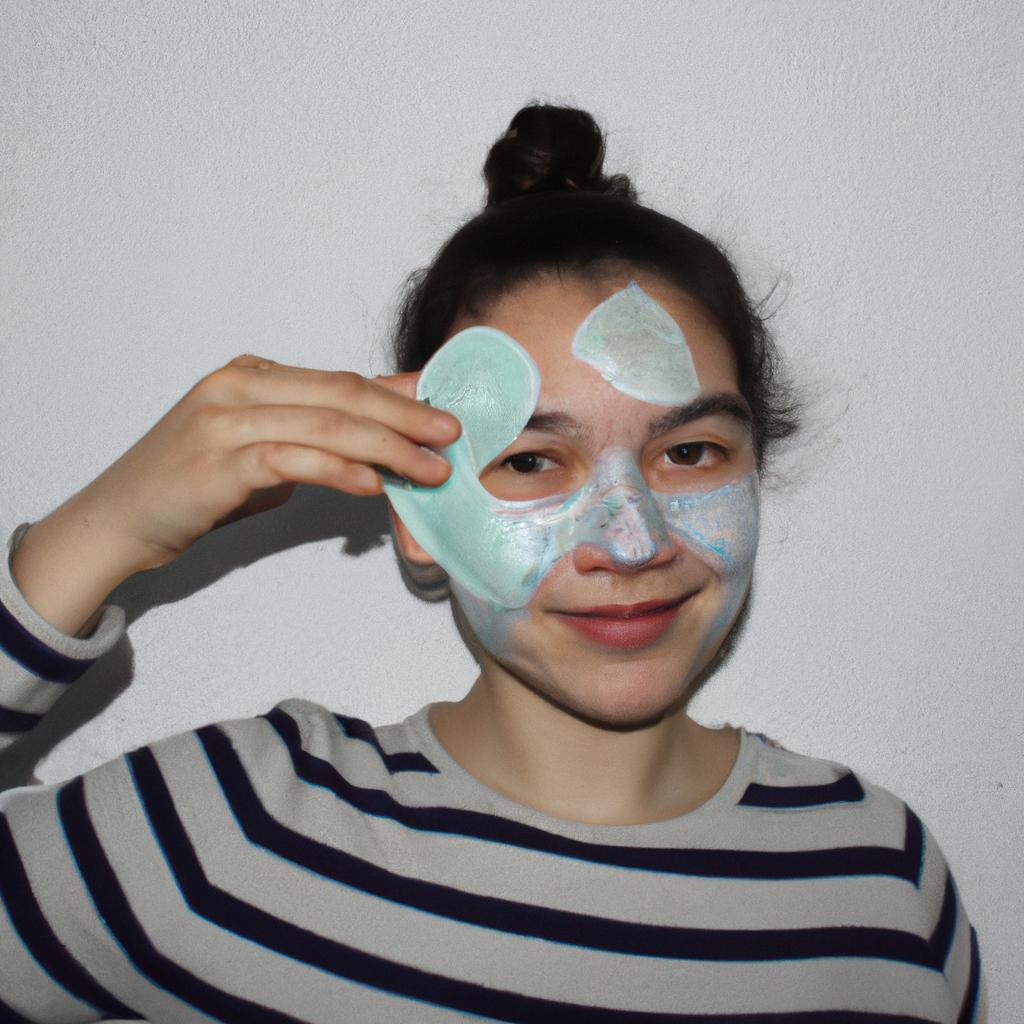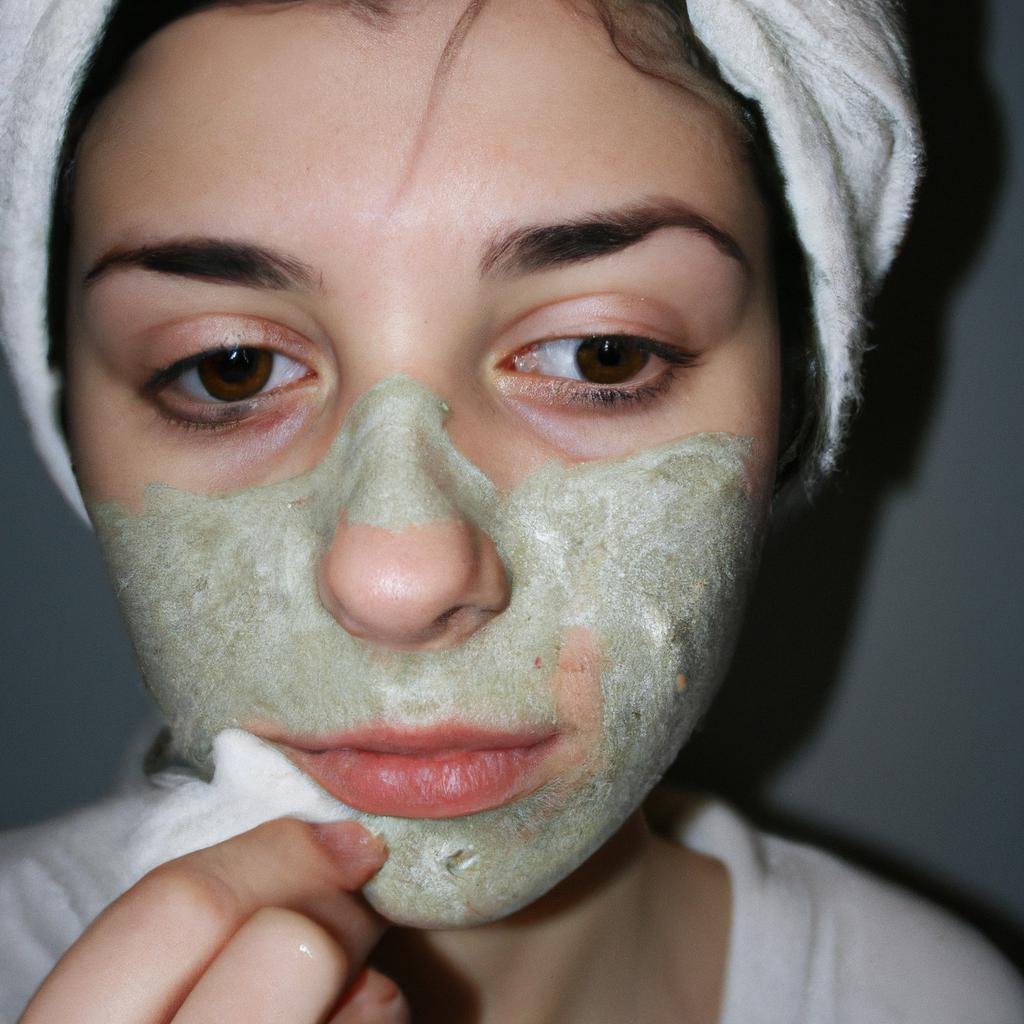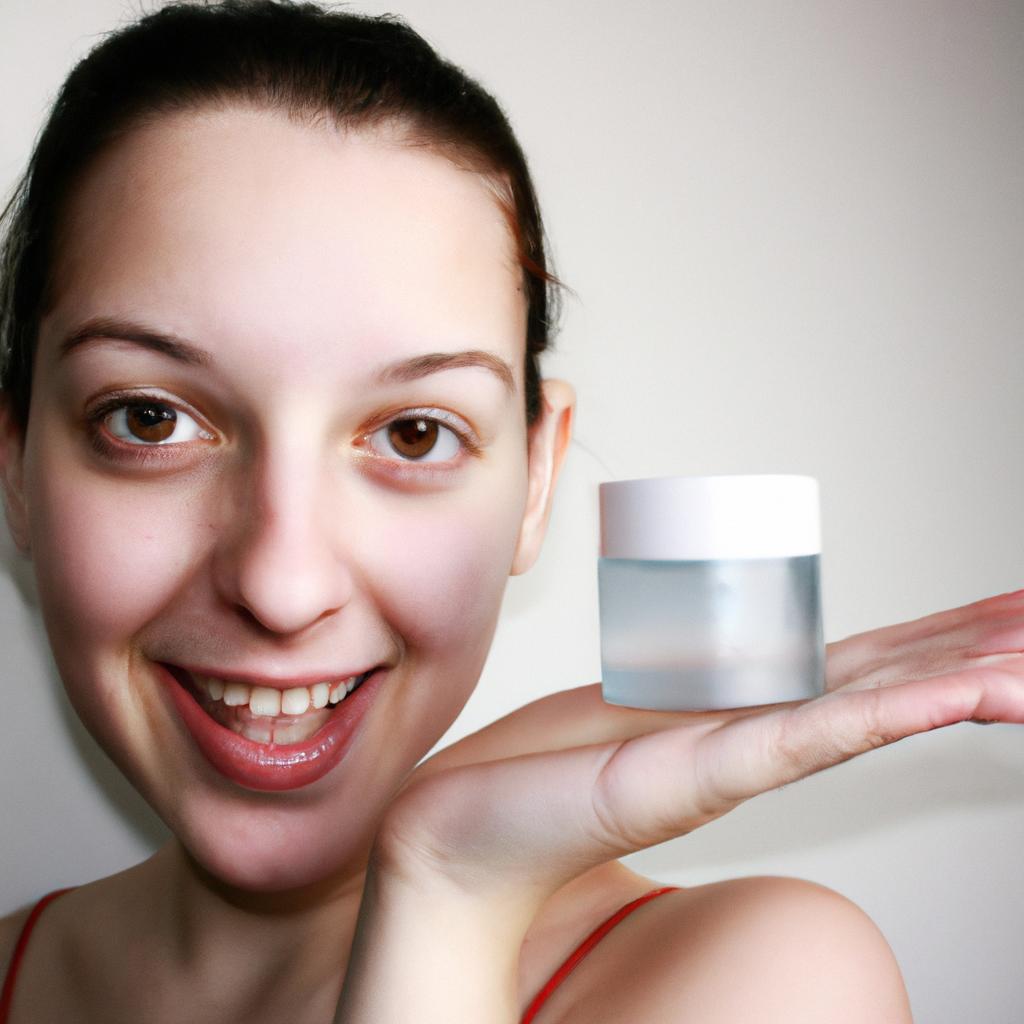Dry and dull skin can be a source of frustration for many individuals, impacting their self-esteem and overall well-being. However, the solution to achieving smooth and radiant skin may lie in something as simple as moisturizing regularly. Consider the case of Sarah, a 32-year-old woman who had been struggling with dry patches on her face for years. Despite trying various skincare products and treatments, she found no relief until she incorporated a consistent moisturizing routine into her daily regimen.
Moisturization is often overlooked or underestimated in the pursuit of healthy skin. This article aims to shed light on the importance of moisturizing by examining its effects on various aspects of skin health. By delving into scientific research and exploring the underlying mechanisms at play, we will uncover how moisture retention contributes to enhanced hydration levels, improved barrier function, reduced signs of aging, and an overall youthful appearance. Furthermore, this article will provide practical tips and recommendations for choosing suitable moisturizers based on individual skin types and concerns. In essence, understanding the significance of proper moisturization can empower individuals to unlock the key to beautiful skin.
Importance of Hydration
Imagine a woman in her late thirties, struggling with dry and dull skin. Despite using various skincare products, nothing seems to restore the natural radiance she once had. This hypothetical scenario highlights an issue that many individuals face – the lack of proper hydration for their skin. In this section, we will explore the importance of hydration for maintaining healthy and beautiful skin.
Hydration is essential for our overall well-being, and it plays a crucial role in supporting the health of our largest organ – the skin. When our bodies are dehydrated, our skin becomes more susceptible to damage from external factors such as pollution and UV radiation. Additionally, dehydration can lead to a weakened skin barrier function, resulting in increased sensitivity and moisture loss.
To emphasize the significance of hydration further, consider these key points:
- Enhanced Skin Elasticity: Well-hydrated skin retains its elasticity better than dry or dehydrated skin.
- Reduced Wrinkles and Fine Lines: Properly hydrated skin tends to have fewer wrinkles and fine lines due to improved plumpness.
- Improved Complexion: Adequate hydration helps even out your complexion by reducing redness and promoting a healthier-looking glow.
- Faster Wound Healing: Moisturized skin heals faster compared to dry skin because it has an optimal environment for cellular repair.
| Improved Skin Texture | Enhanced Radiance | Youthful Appearance | Boosted Confidence |
|---|---|---|---|
| Smoother | Glowing | Plumper | Empowered |
| Softer | Luminous | Firmer | Radiant |
| More supple | Healthy | Renewed | Vibrant |
By incorporating moisturizers into your skincare routine, you provide your skin with much-needed nourishment and protection against environmental stressors. However, choosing the right moisturizer can be a daunting task.
Choosing the Right Moisturizer
Building on the importance of hydration, it is essential to choose the right moisturizer for your skin type. By selecting a suitable moisturizer, you can provide your skin with the nourishment and hydration it needs to maintain its natural beauty. Let’s explore some key considerations when choosing the perfect moisturizer.
To illustrate the significance of selecting an appropriate moisturizer, consider this hypothetical scenario: Emma has dry, sensitive skin that often feels tight and becomes easily irritated. She decides to try out a new moisturizer specifically formulated for dry and sensitive skin types. After consistent use for a few weeks, Emma notices remarkable improvements in her complexion – her skin appears smoother, more supple, and free from irritation. This example demonstrates how finding the right moisturizer tailored to your specific needs can have transformative effects on your skin.
When searching for a moisturizer, keep these factors in mind:
- Skin Type: Determine whether you have oily, dry, combination, or sensitive skin. Each type requires different formulations to address their unique needs.
- Ingredients: Look for hydrating ingredients such as hyaluronic acid or glycerin which help attract moisture to the skin. Avoid products containing potential irritants like fragrances or alcohol.
- SPF Protection: Consider using a moisturizer with built-in sun protection factor (SPF) to shield your skin from harmful UV rays.
- Texture: Find a texture that suits your preferences – lighter lotions are better suited for oilier complexions while creams or balms may be ideal for drier skins.
- Hydrate – Provide deep nourishment and replenish moisture levels
- Protect – Shield against environmental aggressors and premature aging caused by sun exposure
- Soothe – Calm redness and irritation through gentle formulation
- Restore – Strengthen the skin barrier function and promote a healthy complexion
Markdown format table:
| Skin Type | Recommended Moisturizer | Benefits |
|---|---|---|
| Dry | Rich, creamy moisturizers | Deep hydration and improved skin texture |
| Oily | Lightweight, oil-free gels or lotions | Non-greasy formula that won’t clog pores |
| Combination | Hydrating serums combined with light creams or gels | Balances moisture levels in different areas of the face |
| Sensitive | Fragrance-free, hypoallergenic formulas | Soothes irritation and minimizes potential allergic reactions |
Incorporating these considerations into your search for the perfect moisturizer will help you cater to your skin’s specific needs. By doing so, you can ensure that your skincare routine provides optimal nourishment and hydration.
With a thorough understanding of selecting an appropriate moisturizer, let’s now delve into creating an effective daily moisturizing routine that complements our choice.
Daily Moisturizing Routine
Choosing the right moisturizer is crucial for maintaining healthy and beautiful skin. In the previous section, we discussed the factors to consider when selecting a suitable moisturizer. Now, let’s delve into establishing a daily moisturizing routine that will help you achieve optimal results.
Imagine this scenario: Sarah, a 35-year-old woman with dry and sensitive skin, was struggling to find an effective moisturizer. She tried various products but none seemed to provide long-lasting hydration or relief from her skin issues. Frustrated, she decided to consult a dermatologist who recommended incorporating specific steps into her daily skincare regimen.
To establish an effective daily moisturizing routine, follow these guidelines:
-
Cleanse your face thoroughly: Before applying any moisturizer, ensure your face is clean and free of impurities. Use a gentle cleanser that suits your skin type to remove dirt, oil, and makeup residue.
-
Apply toner: After cleansing, use a mild toner to balance the pH levels of your skin and prepare it for better absorption of moisture. Look for alcohol-free toners with soothing ingredients like rose water or chamomile extract.
-
Choose the right moisturizer: Based on your skin type and concerns identified in the previous section, select a suitable moisturizer that caters to your needs. Consider factors such as texture (gel-based for oily skin; cream-based for dry skin), ingredients (hyaluronic acid for hydration; ceramides for barrier repair), and SPF protection if required.
-
Massage in upward motions: Once you have applied the moisturizer onto your face and neck area, gently massage it using upward strokes. This technique helps improve blood circulation while ensuring even distribution of the product across all areas.
Incorporating these steps into her daily routine transformed Sarah’s experience with moisturizers significantly. Her once-dull complexion became radiant, and her dryness reduced considerably over time.
To further understand the impact of a good moisturizing routine, let’s take a look at the following table:
| Skin Type | Moisturizer Texture | Results |
|---|---|---|
| Dry | Cream-based | Improved hydration |
| Oily | Gel-based | Reduced greasiness |
| Combination | Lightweight lotion | Balanced moisture |
As you can see from this table, choosing the right moisturizer texture based on your skin type yields specific benefits. By customizing your daily routine and incorporating suitable products, you can achieve healthier and more beautiful skin.
In our next section on “Natural Remedies for Moisturizing,” we will explore alternative methods to keep your skin hydrated without relying solely on commercial products. Transitioning seamlessly into this topic, let’s delve deeper into enhancing skincare through natural means.
Natural Remedies for Moisturizing
Transitioning smoothly from the previous section, let us now explore some natural remedies for moisturizing your skin. These remedies can be a great addition to your daily routine and help you achieve beautiful, healthy-looking skin.
Imagine this scenario: Sarah has been struggling with dry patches on her face for weeks. She tried various commercial moisturizers, but none of them seemed to provide long-lasting hydration. Frustrated by the lack of results, she decided to give natural remedies a try. To her surprise, incorporating these remedies into her skincare routine made a noticeable difference in just a few days.
Here are four effective natural remedies that you can consider:
-
Honey: Known for its humectant properties, honey helps retain moisture in the skin. Apply raw honey onto clean skin and leave it on for 15-20 minutes before rinsing off gently with warm water.
-
Aloe Vera Gel: Extracted from the leaves of the Aloe vera plant, this gel is highly hydrating and soothing. Massage a small amount of pure aloe vera gel onto your face and let it absorb for about 10 minutes before rinsing off or leaving it overnight as an intensive treatment.
-
Coconut Oil: Rich in fatty acids, coconut oil acts as an excellent emollient to nourish and soften the skin. Gently massage melted coconut oil onto damp skin after showering or bathing for optimal absorption.
-
Cucumber Slices: Place chilled cucumber slices on your face for around 10-15 minutes to benefit from their high water content and cooling effect. This remedy not only provides hydration but also reduces puffiness and inflammation.
To further illustrate how these remedies can enhance your skincare routine, here’s a table comparing their benefits:
| Remedies | Key Benefits |
|---|---|
| Honey | Retains moisture; soothes irritated skin |
| Aloe Vera Gel | Hydrates; reduces redness and inflammation |
| Coconut Oil | Nourishes; softens dry skin |
| Cucumber | Hydrates; cools and refreshes the skin |
By incorporating these natural remedies into your daily moisturizing routine, you can experience improved hydration, enhanced skin texture, and a radiant complexion.
Transitioning smoothly to our next section about “Moisturizing for Different Skin Types,” let’s explore how adjusting your moisturizing methods can cater to specific skin needs.
Moisturizing for Different Skin Types
Having discussed the importance of moisturizing in the previous section, let us now explore some natural remedies that can effectively replenish and hydrate your skin. To illustrate their effectiveness, consider the following example:
Example: Sarah, a 35-year-old woman with dry and flaky skin, struggled to find a suitable moisturizer that provided long-lasting hydration. Frustrated with commercial products, she decided to try natural remedies recommended by her dermatologist.
Paragraph 1:
- Aloe Vera: This miraculous plant is known for its soothing properties and ability to lock in moisture. Extract fresh gel from an aloe vera leaf and gently massage it onto your face. Leave it on for about 10 minutes before rinsing off with lukewarm water.
- Coconut Oil: Rich in healthy fats, coconut oil acts as an excellent emollient for dry skin. Apply a small amount of organic extra virgin coconut oil onto cleansed skin and massage in circular motions until fully absorbed.
- Honey: With its humectant properties, honey helps attract moisture to the skin while providing essential nutrients. Mix two tablespoons of raw honey with one tablespoon of olive oil and apply evenly over your face. Rinse off after 15 minutes.
Bullet point list (emotional response – satisfaction):
Here are four reasons why incorporating natural remedies into your skincare routine can be beneficial:
- Environmentally friendly
- Free from harmful chemicals
- Cost-effective alternative
- Potential improvement in overall skin health
| Ingredient | Benefits | How to Use |
|---|---|---|
| Aloe Vera | Soothes inflammation | Directly apply gel or use in DIY masks |
| Coconut Oil | Deeply nourishes and softens | Apply directly or mix with other oils |
| Honey | Retains moisture and adds a natural glow | Use as a mask or in combination recipes |
| Olive Oil | Locks in hydration and restores skin’s elasticity | Apply directly or mix with essential oil |
Paragraph 3:
By incorporating these natural remedies into your skincare routine, you can experience the benefits of improved hydration, reduced dryness, and overall healthier-looking skin. Remember that consistency is key when it comes to achieving optimal results. In the subsequent section about “Common Mistakes to Avoid,” we will explore some misconceptions related to moisturizing techniques.
As we delve further into effective moisturization techniques, let us now discuss some common mistakes to avoid for maintaining beautiful and nourished skin.
Common Mistakes to Avoid
In the previous section, we discussed the importance of moisturizing and its benefits for achieving beautiful skin. Now, let’s delve deeper into how to choose the right moisturizer based on your specific skin type.
Imagine a scenario where Sarah has dry skin that often feels tight and flaky. She decides to invest in a new moisturizer but finds herself overwhelmed by the countless options available. Understanding her skin type is crucial in selecting an effective product.
For individuals with dry skin like Sarah, it is essential to opt for a rich, creamy moisturizer that provides deep hydration. Look out for key ingredients such as hyaluronic acid or glycerin which help retain moisture in the skin. Additionally, ceramides can strengthen the skin barrier, preventing further water loss.
Differentiating between oily and combination skin can also influence your choice of moisturizer. For those with oily skin, lightweight formulas that are oil-free and non-comedogenic are ideal. These products will hydrate without clogging pores or exacerbating shine. Conversely, individuals with combination skin may benefit from using different moisturizers on their T-zone (forehead, nose, chin) compared to drier areas such as cheeks.
To summarize:
-
Dry Skin:
- Look for rich, creamy formulas
- Hyaluronic acid and glycerin provide intense hydration
- Ceramides strengthen the skin barrier
-
Oily Skin:
- Opt for lightweight, oil-free formulations
- Non-comedogenic properties prevent pore blockage
-
Combination Skin:
- Consider using separate products for different areas
- Focus on lightweight formulas for oily zones
Now that we have explored some general guidelines for choosing moisturizers according to different skin types, let’s take a closer look at common mistakes people tend to make when it comes to skincare routines.
 Stanley Beauty Care
Stanley Beauty Care



